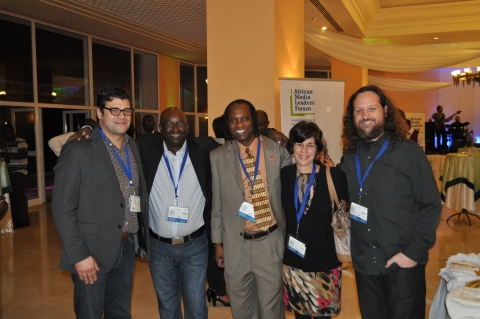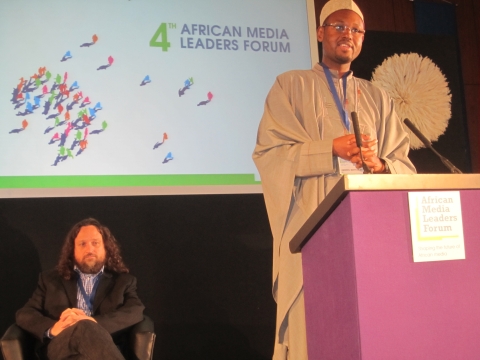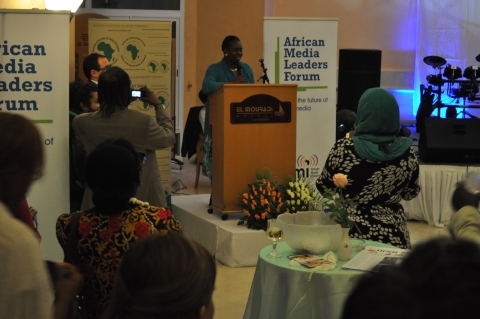
Knight Foundation Vice President Michael Maness (left) with Rhodes University's Chris Kabwato (second from left) and the Knight Fellowship team in Tunis: Knight Fellow Meredith Beal; ICFJ President Joyce Barnathan; and Knight Fellow Justin Arenstein.

Michael Maness of Knight Foundation with Chris Kabwato of Highway Africa.

AMI's Amadou Mahtar Ba announces the challenge while Knight Fellow Justin Arenstein waits to give details.

ICFJ Program Director Jerri Eddings addresses the crowd in Tunis.
Revolutionary ideas are apparently plentiful. The real challenge, they all say, is the near impossible quest to find seed funding or partners to test their ideas.
Well, they now have some options: The African Media Initiative (AMI) has just announced $1 million in funding for a pan-African news innovation fund.
The African News Innovation Challenge (ANIC) will offer grants of $12,500 to $100,000 for the best ideas. But that’s not all. ANIC will give winners access to additional support, ranging from engineering help from tech incubators to one-on-one sessions with business mentors, market analysts and content specialists to help fine-tune projects. Once the winners have built something that works, using rapid prototyping and lean startup processes, ANIC will help showcase the best projects at international media and journalism conferences or even at tech events such as SXSW.
And while it is true that the fund will focus on technological solutions with a special emphasis on mobile media, it isn’t just for geeks. ANIC will also proactively invite pioneering ideas from investigative and data journalists, plus those working in the citizen journalist, civic media, and crowdsourcing sectors.
The idea is to find people with disruptive ideas and realistic plans that have the potential to reboot the way that African newsrooms operate. Once we’ve found these enterprising people, we hope to help them develop proof-of-concept prototypes to convince “real world” media to adopt the new solutions. AMI will help get the ball rolling by piloting the most promising projects in partner newsrooms. This is an essential part of what makes ANIC different from so many other innovation challenges. AMI is Africa’s largest umbrella association for the owners and top executives of the continent’s “legacy” media. It has a direct line to the most powerful decision makers in Africa’s media ecosystem – and is offering to use it to help innovators.
ANIC is the most ambitious initiative of its kind on the continent. But it targets people who already have some degree of tech capability. It doesn’t really offer solutions to the visionary journalists or media managers who have good ideas, but no real tech skills. So, where do they find the geeks, coders and hacktivists who would be able to turn ideas into tangible products?
AMI is again offering a possible answer: It has begun seeding a network of HacksHackers chapters across the continent, to bring together technologists and media people for collaborative projects. As we’ve seen in Kenya, Ghana, and elsewhere, there are thousands of really talented geeks who are itching to reinvent the world. They are brilliant at building tech platforms or mobile apps – but few of them understand content, or how to engage with audiences in compelling ways. A similar challenge faces media pioneers: They have the content, but no mechanism for reaching audiences. AMI hopes that the HacksHackers chapters will help like-minded entrepreneurs find each other.
Each HacksHackers chapter will meet at least once per month for seminars, hackathons, or skills workshops. And to help kickstart the often painful process of building teams and testing ideas, each HacksHackers chapter will run its own small quarterly innovation challenge. The prizes will be much smaller than those offered by ANIC, ranging from cash grants of $1,000 to $5,000, to simply hardware, training, or software prizes. The focus isn’t on massive prizes, but rather on building a community of innovators and collaborators who aren’t afraid to experiment.
The first HacksHackers chapters in Africa are coming together in Ghana, Kenya, and Uganda. If you think AMI should also help launch one in your city, give me a shout and join the revolution.
- The ANIC website will launch in mid-December 2011, with detailed instructions on how to enter the contest.
- The HacksHackers Africa website will launch in January 2012, with a toolkit to help you launch your own local chapter.
ANIC is supported via either cash sponsorship or technical support by the Omidyar Network, Google, The Bill & Melinda Gates Foundation, the John S. and James L. Knight Foundation, the World Association of Newspapers and News Producers (WAN-IFRA), the US State Department, and the Konrad Adenauer Stiftung.
The International Center for Journalists helped pull together the partners for both ANIC and HacksHackers Africa, by supporting my work with AMI over the past five months through a Knight International Journalism Fellowship.